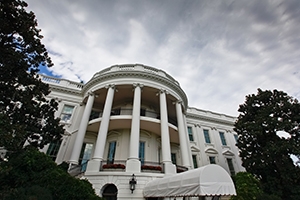Research
The New Imperial Presidency

SPA professor Chris Edelson's new book examines presidential power since 9/11.
Barack Obama’s 2008 election was widely viewed as a rebuke of George W. Bush’s previous eight years in office. That famed campaign slogan, “Change We Can Believe In,” signaled a dramatic shift from Bush Country to Obama’s America. And, sure enough, President Obama charted a new course on plenty of domestic policy issues.
But on national security, American University School of Public Affairs professor Chris Edelson argues, the differences between the Obama and Bush administrations are often more stylistic than substantive. Both presidents, operating in a post-9/11 environment, have exceeded their constitutional authority and exercised too much power, Edelson says.
Edelson lays out these arguments in his latest book, Power Without Constraint: The Post-9/11 Presidency and National Security. “What I was interested in finding out is, ‘How has the presidency expanded since 9/11? How can these actions be justified?’” he says in an interview.
Bush, Obama, and “Unitary Executive Theory”
The Bush administration utilized a so-called Unitary Executive Theory. “It’s the idea that the president can set aside laws, even criminal laws, that infringe on his view on executive power. It’s an astounding view. It totally contradicts checks and balances,” Edelson says.
The Constitution grants Congress the authority to declare war. Soon after the September 11 terrorist attacks, a Bush administration lawyer wrote a then-secret memo asserting that decisions involving the use of military force are the president’s alone to make. “In fact, it said if Congress tries to limit the president in this area, the president can ignore it,” he adds.
“You won’t see that language showing up in the Obama administration, but they reach the same result,” he explains.
For instance, without congressional approval, Obama used military force in Libya.
“He justified it mostly on past practice. In other words, other presidents have done the same thing,” Edelson explains. “Obama never says, ‘I can do whatever I want,’ like the Unitary Executive Theory. But in practice, it’s hard to see where the limits are. He basically finds ways to do what he thinks is necessary.”
Drone Strikes and Torture
Obama’s authorization of drone strikes has provoked controversy and drawn criticism from his own liberal base. Edelson believes drone strikes are perfectly legitimate military weapons to use against sworn enemies, such as members of the Al Qaeda leadership. Yet it gets a little murky when there’s no congressional approval and limited information about the target.
Critics have pointed to the strike that killed Anwar al-Awlaki, a propagandist and U.S. citizen born in New Mexico. Though he espoused abhorrent views, Edelson says allegations that he was planning attacks against the United States were never proven.
“The Obama administration’s position is, ‘We can decide on our own, with no involvement from Congress or the courts, which U.S. citizens are terrorists. And we’ll target them.’ I just think it gives the president too much power.”
Obama’s uses of executive power, Edelson emphasizes, are not identical to Bush’s. One example is the Obama administration’s reported abandonment of waterboarding and other forms of torture.
However, the Obama administration has declined to prosecute U.S. officials who previously engaged in torture. Edelson says this is an understandable, but problematic, position to take. First, the U.S. is a party to the United Nations Convention against Torture and Other Cruel, Inhuman, or Degrading Treatment or Punishment. In addition, he worries about setting a troublesome precedent.
“By not prosecuting people who waterboarded, or authorized it, what it tells future presidents is, ‘You can do this with impunity,’” he says. He notes that Donald Trump has stated he’ll waterboard terrorist suspects, and the Republican presidential candidate has no reason to fear any consequences.
The Next President
Political observers—on both the right and the left—have raised concerns about a potential Trump presidency and its impact on democracy. Having never held elective office, he was only answerable to himself while running his real estate empire. Trump detractors charge that he’s disdainful of the media, with a deeply authoritarian streak.
Edelson wrote about these issues in the National Review, and he fears what Trump might do in this post-9/11 atmosphere. “The precedent right now is presidents can use military force, as long as it doesn’t involve ground troops, without congressional authorization,” he says. “So you might think it’s in the national interest to use force against ISIS, but what if a President Trump decides it’s in the national interest to use military force against Mexico?”
He doesn’t feel a Hillary Clinton presidency would provide restoration to the constitutional order, either. Edelson notes her support for that same Libyan intervention, conducted without congressional approval.
History and Unchecked Power
To justify its post-9/11 actions, the Bush administration frequently invoked Abraham Lincoln’s exercise of wartime power. But Edelson believes that comparison doesn’t hold up. Lincoln’s suspension of Habeas Corpus was an emergency measure. He knew he was temporarily acting outside of his constitutional authority, whereas Bush was asserting his right to do just that, continuously.
As the Framers of the Constitution anticipated, presidents are inclined towards amassing power. In Federalist 51, Alexander Hamilton and James Madison wrote, “If men were angels, no government would be necessary. If angels were to govern men, neither external nor internal controls on government would be necessary.”
At the time a nationalist for a strong central government, Madison later became a Jeffersonian republican. As president, Madison’s aversion to federalism was so pronounced that historians blame him for halfheartedly fighting the War of 1812.
Yet whatever the circumstances, Edelson says we shouldn’t rely on a president’s sound judgment or better angels.
“Why would you give any one person unrestrained power? Basically you’re trusting that they’ll use it responsibly, and I think that’s a dangerous proposition.”

